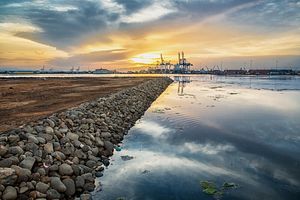A recent report that China is negotiating the opening of a military base in the East African country of Djibouti is certain to prompt speculation among Western nations, particularly the United States, which already have troops in the strategic regional hub. The move is certainly worth attention, but any alarm is premature.
The news, if true, is a good indication of China’s growing confidence in projecting its military – particularly its fledgling navy – beyond its Pacific comfort zone. It is also an indicator of the Asian giant’s ambition to expand its presence in a region that is at the forefront of global conflicts and interests, where great powers jockey for influence.
At a Monday press briefing in Beijing, Chinese Foreign Ministry Spokeswoman Hua Chunying did not directly confirm the news, but said China is willing to contribute more to protecting regional peace and stability along with Djibouti and other countries.
Facing the Strait of Bab el-Mandab, the Persian Gulf’s lifeblood and one of the world’s most crucial checkpoints for oil transits, the tiny nation of Djibouti, with a population of fewer than one million, has been busy playing host to American, Japanese and French military bases, who rely on its geographic importance for anti-piracy purposes.
The fact that Djibouti borders conflict-ridden Somalia has also made it a key regional venue for the global war on terrorism – led by American forces trying to wipe out the insurgency of Somali terrorist group Al-Shabaab.
Djibouti’s relative stable political environment has attracted China, which for decades has been building energy and infrastructure projects such as the ongoing cross-border water and railway projects between Djibouti and Ethiopia. Djibouti is also a critical player in Chinese President Xi Jinping’s ambitious “One Belt, One Road” initiative, aimed at establishing a greater Chinese economic and political footprint across the globe.
The Chinese military isn’t new to Djibouti. But unlike the Americans who need Camp Lemonnier to provide regional security, China’s primary goal since 2008 has been to ensure its civilian ships are not harassed by pirates in the nearby Gulf of Aden. Consequently, it has only needed temporary logistical access to the ports instead of troops on the ground.
A rapid evacuation of Chinese and foreign nationals by the People’s Liberation Army Navy last month in Yemen was smart military diplomacy, and sent a message that China is starting to test the waters in a new arena, and it is willing to shoulder its responsibilities there. So setting up its first-ever formal military base overseas seems to be a natural next step.
The talks around it could have begun as early as March 2013, when Djibouti navy commander Col. Abdourahman Aden Cher told Chinese state-run newspaper the Global Times that he would welcome a Chinese base in the country.
But before the PLA Navy acquires the hard power to operate comfortably in the Middle East and North Africa, China – under Xi’s expansive global vision – will continue on its current path of building a soft military presence, focusing on military-to-military exchanges and disaster relief, wrote Sun Degang, a Middle East expert at Shanghai International Studies University.
“The United States, Britain, and France rely primarily on military bases to protect their geopolitical interests in the Middle East. China, India, and South Korea rely on temporary military exchanges to protect geoeconomic interest.” Sun wrote for the non-partisan Middle East Institute.
Given that China’s current economy-first global strategy, Beijing will be unlikely pit itself against a powerful American military, which is the primary security guarantor for local Chinese investments. Fears that a Chinese military base is a move to take on the region’s prevailing security heavyweight are misplaced.
As Sun explained, “The Western and Eastern powers have thus created complementary power structures in the region, providing an opportunity for increasing strategic coordination.”
Kevin Wang is a CNN international news editor based in Atlanta. The views here are his own.
































